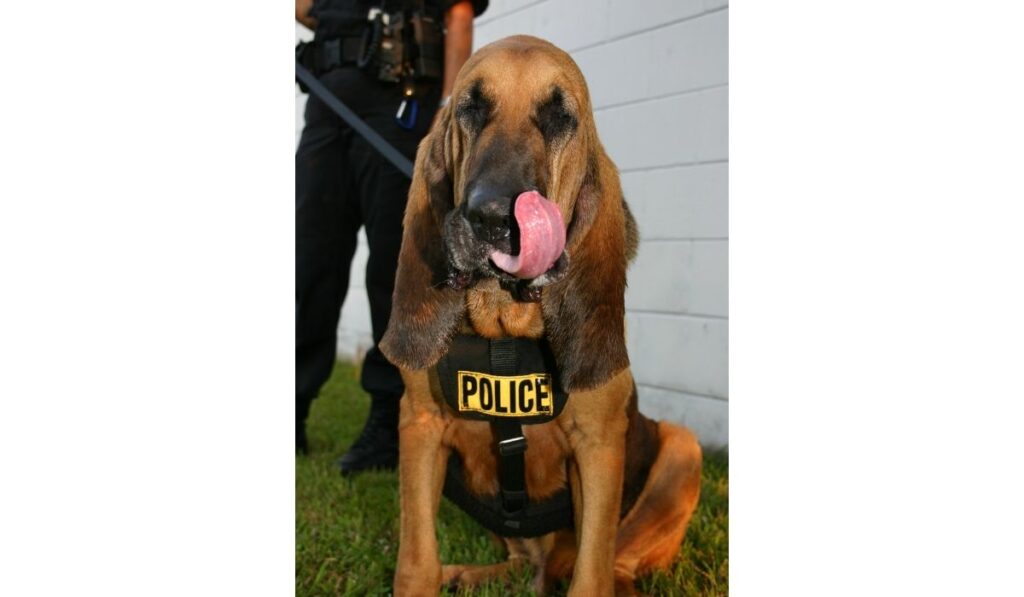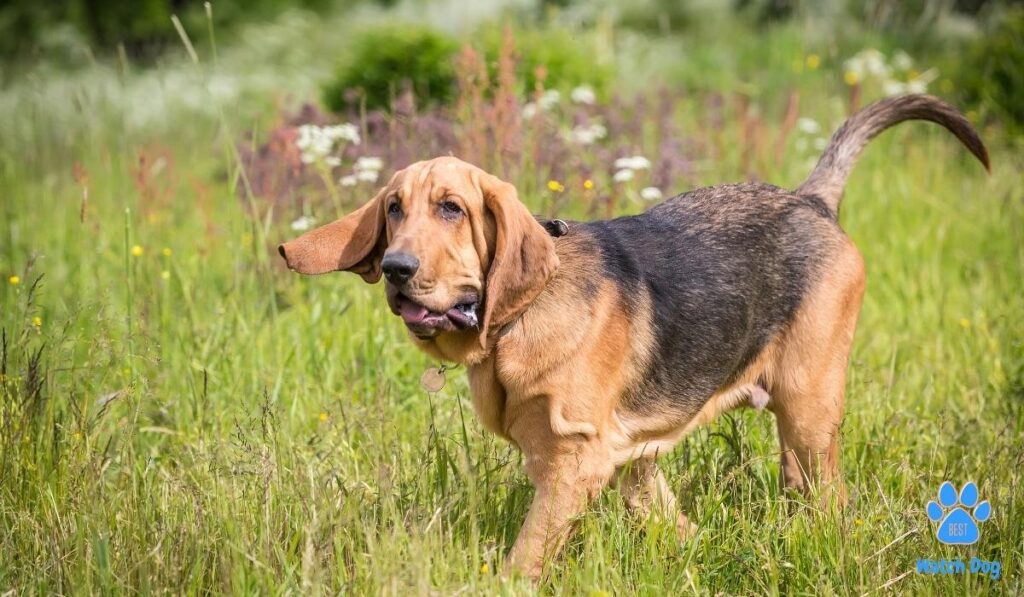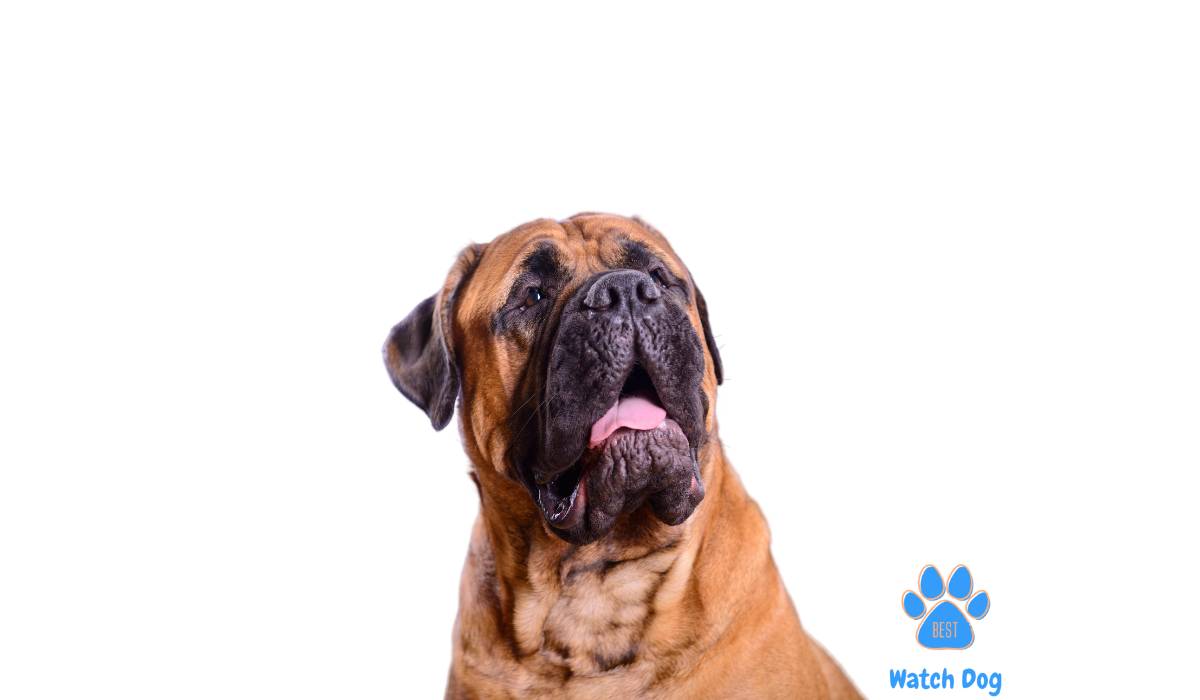Do you need a guard dog for your home or business?
If so, you may be wondering if a bloodhound is the right breed for you. These dogs are known for their incredible sense of smell and tracking abilities.
They can be used for a variety of purposes, including search and rescue, law enforcement, and even hunting.
But are bloodhounds good guard dogs?
In this blog post, we will answer this and more questions about this amazing breed.

Are Bloodhounds Good Guard Dogs?
No, bloodhounds are not good guard dogs. They are gentle, loving, and even-tempered. This makes them terrible guard dogs because they are more likely to welcome a burglar than bark at them. Bloodhounds are also extremely social, making them a poor watchdog.
However, their tracking abilities make them excellent security dogs.
If you have a bloodhound as part of your security team, they can track intruders and help you find them.
Reasons Why Bloodhounds Are Not Good Guard Dogs
There are various reasons why bloodhounds are not good guard dogs:
They Are Not Territorial
A guard dog is often used to protect property or area.
They do this by being territorial and aggressive towards anyone who enters their territory.
Bloodhounds, on the other hand, are not territorial. They do not have any aggression in them whatsoever.
They Are Too Friendly
A good guard dog should be mistrusting strangers.
This ensures that they will bark and become aggressive when someone they do not know enters the property.
Bloodhounds, however, are the complete opposite. They are extremely friendly and outgoing.
Note, however, that since each dog has a different personality, you may find one or two bloodhounds that actually bark when strangers come around. But this is not the norm for this breed.
They Are Too Gentle
A bloodhound’s gentle and loving personality makes them terrible guard dogs.
They are more likely to welcome a burglar into your home than bark at them. Most bloodhounds lack the aggression of a true guard dog.
Can You Train A Bloodhound To Be A Guard Dog?

It is easier to train a bloodhound to be a watchdog than it is to train them to be a guard dog.
A watchdog’s job is to bark and alert you when someone is on your property.
They are not trained to attack or apprehend the intruder.
However, it is very difficult, if not impossible, to train a bloodhound to be a guard dog. As we mentioned before, these dogs are too gentle and loving to be effective guard dogs.
So the breed naturally lacks the aggression required for this job.
It is also important to mention that bloodhounds are quite independent-minded and stubborn, which makes their trainability quite low.
This means that even if you could train a bloodhound to be a guard dog, it would take quite a bit of time, effort, and patience.
So, in short, no – you cannot train a bloodhound to be an effective guard dog.
Breed Characteristics
| Blood Hound Characteristics | |
| Weight Ranges | Male: 90-110 pounds Females: 80-100 pounds |
| Life Span | 7-9 years |
| Height at Withers | 23-27 inches |
Coat Characteristics
This bread has a short, smooth, and close coat. The hair is dense and hard. The colors of the coat are black, liver, or tan.
The head of the bloodhound is large and heavy with a long muzzle. The ears are low-set and floppy.
They have a deep chest and a long, muscular body. Their tail is thick at the base and tapers to a point.
They shed heavily, so you will need to brush them regularly. They also drool a lot, so you may want to keep a towel nearby.
Costs
Bloodhounds cost anything from $600 to $1500.
Puppies may cost about $300-$750. You may be able to find cheaper prices at a rescue, but remember that you will not know the dog’s history.
If a puppy has some tracking training, you may have to pay more. However, since most bloodhounds do not make good guard dogs, you may want to save your money and get a different breed.
They are not a good choice for first-time dog owners because of their independent nature and low trainability. They require an owner who is patient, firm, and consistent.
They also need a lot of exercise and space to run around.
Club Recognitions
The American Bloodhound Club. This club offers bloodhound rescue, health information, events, and more.
It also offers the Hall of Fame and a Certificate of Recognition to bloodhounds that have achieved great things.
Bloodhound History

The history of the bloodhound dates back to the Middle Ages.
They were used for hunting by the nobility and were known as “sleuth hounds” or “tracking hounds”.
In England, they were used to track deer, foxes, and other game. In France, they were used to track boar and other large animals.
While the earliest history of this breed is unknown, some Mediterranean texts reference a dog breed with stellar smelling ability.
These dogs were likely the ancestors of the bloodhound.
William the Conqueror brought the first bloodhound to England in the 11th century.
The breed was further developed in England and became a favorite of English royalty.
Queen Victoria, I was particularly fond of bloodhounds and is said to have owned more than 60. Bloodhounds were also used by famous detective Sherlock Holmes in Arthur Conan Doyle’s stories.
The bloodhound we know today was developed in Belgium in the 19th century.
They were bred to be larger and heavier than their English counterparts.
The breed was brought to the United States in the 1800s and has been used for hunting, tracking, and law enforcement work ever since.
Check out this related post: can a greyhound be a guard dog?
Bloodhound Health

Common Health Issues
This breed is relatively healthy, but there are some health conditions to be aware of.
Hip dysplasia is a condition that affects the hip joint and can cause pain and lameness.
It is important to get your dog from a breeder who has OFA (Orthopedic Foundation for Animals) certification that the parents are free of hip dysplasia.
Another condition to be aware of is von Willebrand’s disease, a blood disorder that can cause problems with clotting. This condition is genetic and there is a DNA test that can be done to check for it.
Other health issues that have been seen in the breed include:
• Hypothyroidism
• Skin-fold dermatitis
• Era infections
• Otitis externa
• Gastric/bloat torsion
• Eyelid issues
Feeding
This breed needs a high-quality diet that is rich in protein.
They are prone to weight gain, so it is important to avoid giving them too many treats. Four to eight cups of good-quality dog food given twice a day should be enough.
Exercise
Bloodhounds are a working breed and need a lot of exercise.
A good rule of thumb is at least one hour of exercise per day, but more is better. This can be in the form of walks, runs, hikes, or playing fetch.
They also love to dig, so it is important to provide them with a digging area in your yard. If they do not get enough exercise, they can become bored and destructive.
Training
Bloodhounds are not the easiest breed to train because of their independent nature. They are also known for being stubborn and headstrong.
Patience, firmness, and consistency are key when training this breed. They respond best to positive reinforcement techniques such as treats, praise, and play.
It is important to start training early and be consistent with it throughout their life. Bloodhounds can be difficult to housebreak, so crate training may be necessary.
Grooming
Bloodhounds are low-maintenance when it comes to grooming. They only need to be brushed about once a week to remove dead hair and keep their coat looking healthy.
They are heavy shedders, however, so you may find hair around your house.
They also drool a lot, so it is important to keep their face clean.
Bloodhound Temperament
A bloodhound is a laid-back charmer that is good with kids and other pets.
They are gentle, affectionate, and loyal dogs that make great family pets.

What Do Bloodhounds Do?
Since they have a very strong sense of smell, they like following their nose and exploring.
They are also known for being independent, stubborn, and headstrong.
Bloodhounds are working dogs and were originally bred for hunting deer and wild boar.
Nowadays, they are mostly used for tracking humans (such as in law enforcement) or searching for missing persons.
Do Bloodhounds Make Good Hunting Dogs?
Yes, bloodhounds are excellent hunting dogs. They have a very strong sense of smell and can track deer and other animals for miles.
Are Bloodhounds Loyal?
Yes, bloodhounds are very loyal dogs. They are gentle, affectionate, and make great family pets.
Do Bloodhounds Bark A Lot?
No, bloodhounds do not bark a lot. They are relatively quiet dogs.
Final Thoughts– Can Bloodhounds Be Guard Dogs
Bloodhounds don’t make good guard dogs, they are among the best dogs for families. They are gentle, affectionate, and loyal dogs that make great family pets. Bloodhounds aren’t natural guard dogs. They are also extremely social, making them a poor choice for a watchdog too.
If you are looking for a laid-back charmer of a dog, the bloodhound may be the perfect breed for you.
Looking For Watch Dog Guides?
If you’re looking for more guard dogs resources, consider checking out our other post on guard dogs.
- Is dogo argentino a good guard dog
- Is A Hungarian Vizslas A Good Guard Dog?
- Can Wire Fox Terriers Be Guard Dogs?
- Do English Bulldogs Make Good Guard Dogs?

(Author)
Justin is a protection dog enthusiast. He has years of experience teaching and training dogs. He enjoys sharing what he’s learned. Read More





